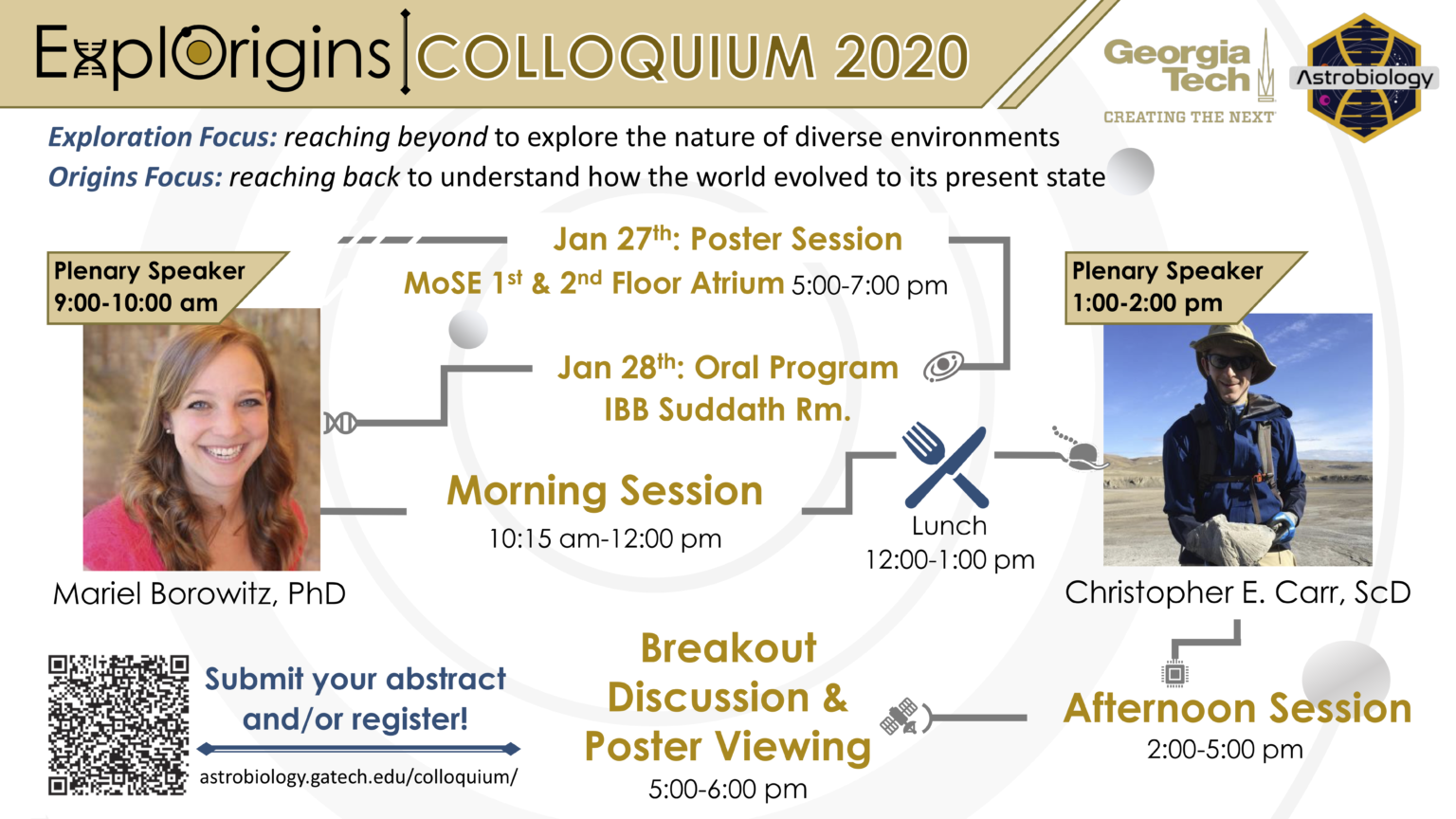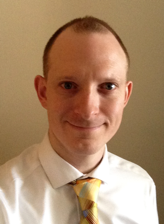
Dear Students, Staff, and Faculty,
On behalf of Georgia Tech Astrobiology and the ExplOrigins early career group, we invite you to join us for the 2020 Exploration and Origins Colloquium.
Please click HERE to register or submit a poster abstract.
The colloquium kicks off with a poster session on Monday January 27th, and continues with a day of plenary lectures, contributed talks, and a breakout networking session on Tuesday, January 28th. If you have any questions regarding the abstract submission process, please email the conference organizers at info.gt.astrob.colloq@gmail.com. Thank you for your consideration.
Schedule:
January 27th, 2020, MoSE 1st and 2nd Floor Atrium
5:00 PM – 7:00 PM: Poster Session
January 28th, 2020, IBB Suddath Seminar Room
8:00 AM – 8:45 AM: Coffee and Poster Viewing
8:45 AM – 8:50 AM: Welcome from College of Sciences Dean Susan Lozier
8:50 AM – 9:00 AM: Exploration and Origins Colloquium Welcome
9:00 AM – 10:00 AM: Plenary 1
Mariel Borowitz: Astrobiology: Science, Technology, Policy, and Politics
10:00 AM – 10:15 AM: Coffee Break
10:20 AM – 12:00 PM: Morning Session (Introduction: Tyler Roche)
-
-
- Kynan Hughson: Possible pingo analogs may populate Ceres
- Micah Schaible: In situ characterization of elemental compositions for small bodies throughout the Solar System
- Bradley Burcar: The impact of CO2 and cyanide in prebiotic environments on mineral formation and urea-based phosphorylation reactions
- Kelvin Smith: Mechanistic Investigation of Depsipeptides in the Early Earth Through Kinetic Monte Carlo Framework
- Petar Penev: Eukaryotic-like ribosomal RNA region in Lokiarchaeota
-
12:00 PM – 1:00 PM: Lunch (MoSE 1st and 2nd floor atrium)
1:00 PM – 2:00 PM: Plenary 2 —
Christopher Carr: A Direct Search for Life As We Know It and Don’t Know It
2:00 PM – 3:00 PM: Afternoon Session 1 (Introduction: Taylor Plattner)
-
-
- Nadia Szeinbaum: Synthetic microbial consortia to explore cooperation on early Earth
- Anthony Burnetti:The dual origins of phototrophy and major evolutionary transitions.
- Devon Cole: Stability of atmospheric oxygen levels and ocean ventilation
-
3:00 – 3:15 PM: Coffee Break
3:15 – 5:00 PM: Afternoon Session 2 (Introduction: Chase Chivers)
-
-
- Philip Szot: Vertical Entry Robot for Navigating Europa (VERNE) Mission and System Design
- Loren Dean Williams: Polymers versus Metabolism
- Adriana Lozoya Colinas: DNA replication facilitated by a prebiotic solvent
- Aaron Pital: Semantic mining of chemical origins from non-chemistry disciplines
-
5:00-6:00: Networking breakout session
Plenary Speakers
Mariel Borowitz

Assistant Professor, Sam Nunn School of International Affairs,
Georgia Institute of Technology
Astrobiology: Science, Technology, Policy, and Politics
Mariel Borowitz is an Assistant Professor in the Sam Nunn School of International Affairs at Georgia Tech. Her research deals with international space policy issues, including international cooperation in Earth observing satellites and satellite data sharing policies. She also focuses on strategy and developments in space security and space situational awareness. Dr. Borowitz earned a PhD in Public Policy at the University of Maryland and a Masters degree in International Science and Technology Policy from the George Washington University. She has a Bachelor of Science degree in Aerospace Engineering from the Massachusetts Institute of Technology. Dr. Borowitz completed a detail as a policy analyst for the Science Mission Directorate at NASA Headquarters in Washington, DC from 2016 to 2018. Her book, “Open Space: The Global Effort for Open Access to Environmental Satellite Data,” was published by MIT Press in 2017.
Christopher E. Carr

Research Scientist, MIT
Research Fellow, MGH
A Direct Search for Life As We Know It and Don’t Know It
Christopher E. Carr is an engineer/scientist in Cambridge, Massachusetts, USA. He serves as the Science PI or PI for several life detection instrument and/or astrobiology projects. He is broadly interested in searching for and expanding the presence of life beyond Earth while enabling a sustainable human future. He is currently a Research Scientist at MIT in the Department of Earth, Atmospheric and Planetary Sciences, and a Research Fellow at the Massachusetts General Hospital in the Department of Molecular Biology. He also serves as a Scott M. Johnson Fellow in the U.S. Japan Leadership Program. This summer he will join the Georgia Tech faculty as an Assistant Professor in the Daniel Guggenheim School of Aerospace Engineering, with a secondary appointment in the School of Earth and Atmospheric Sciences.
2020 Exploration and Origins Colloquium:
This interdisciplinary colloquium will highlight space exploration science and origins research going on at the Georgia Institute of Technology, as well as neighboring universities. The goals of the colloquium are to forge relationships between diverse individuals, encourage collaboration and interdisciplinary understanding, and kick-start future fundable projects requiring the skills and expertise of multi-lab teams.
As previously, the colloquium will be roughly split into two sections: Exploration and Origins. While outlines of the two sections are provided below, the scope of abstracts considered will be broad. Past submissions have been from the departments of Earth and Atmospheric Sciences, Chemistry & Biochemistry, Biology, Physics, Mathematics, and multiple engineering departments. We emphasize that all interested parties are welcome regardless of discipline or affiliation. Exploration: For the Exploration session, we are particularly interested in submissions that deal with any and all aspects of reaching beyond to explore the nature of diverse environments. Examples include space technology development, spacecraft mission design, planetary science modeling, biological or ecological fieldwork and direct observations of extrasolar systems; in short, exploring what is ‘out there’, wherever ‘there’ is. Origins: Submissions for the Origins session are encouraged to include some aspect of reaching back to understand the nature of the world today. Examples include cosmology and the origins of life itself, the emergence of multicellularity, the evolution of minerals, complex chemistry, atmospheres, and biological molecules or processes, and the formation of planetary systems; basically, how did we get here?Abstract Pages:
The pages linked here contain a selection of abstracts from our submitting attendees.
Poster Guidelines:
The poster boards we will be using have dimensions 36″ by 42″. You may choose to set your poster up in a portrait or landscape orientation.
The organizing committee:
Aaron Pital (Graduate Student, Chemistry and Biochemistry)
Chase Chivers (Graduate Student, Earth and Atmospheric Sciences)
Christina Buffo (Graduate Student, Chemistry and Biochemistry)
Tyler Roche (Graduate Student, Chemistry and Biochemistry)
Rebecca Guth-Metzler (Graduate Student, Chemistry and Biochemistry)
Taylor Plattner (Graduate Student, Earth and Atmospheric Sciences)
Micah Schaible (Postdoctoral Fellow, Chemistry and Biochemistry)
Funding and Support:
We are grateful for the funding and support provided by CSTAR, GT Conference Support, the School of Earth and Environmental Sciences, the School of Chemistry and Biochemistry, and Frank Rosenzweig (NAI, CAN-7)
